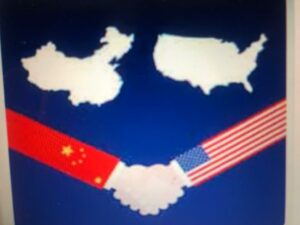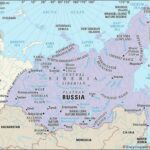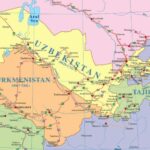Historically we had until now two wave of globalisation:
- The UK driven globalisation at Queen Victoria times, when UK controlled directly or indirectly about 100% of the world, through a maritime ring approach from Gibraltar to Suez until Singapore, between 1880 to 1945. Twice Germany tried to break UK hegemony with two world wars: Germany lost, UK passed leadership to USA, its ex colony.
- The USA driven globalisation from 1945, when Soviet Union tried to oppose worldwide through cold war, losing it in 1989 and abandoning Central Europe and Central Asia. The USA hegemony was established with the same strategy of UK, controlling sea ring, but employing enormous amount of military forces, fleets and hundreds of land basis in all the world.
In the last ten years everyone is expecting a third wave of globalisation China driven, the opposition should come from USA and ,from the Cuba war, Americans had always used war as a political strategy to keep on their hegemony. So the most probable USA reaction should be a war, in the last ten years mostly involving allied countries of OTAN, or effected through other people locally in conflict with new emerging powers. In the case of China one could think to use Russia, but probably now after the Russian-phobic choice pro Ukraina, only India and Japan could remain .
Notwithstanding this easier forecast and on the basis of historical relationships between China and USA and on the economic-financial ties existing between the two giants, I support here a bi-cephalic wave of globalisation, where the two countries can coexist in a leadership position, solution of coexistence encouraged by the most famous American political expert, the centennial Henry Kissinger. Historically modern China has been created with substantial financial support from USA, for sustaining China from 1937 war with Japan. Economic help and military counseling has been supplied to nationalists of Chiang Kai-shek, and to communist of Mao Tse -tung, which didn’t receive so much support from Stalin Soviet Union. The Chinese-Japanese war was a disaster and only atomic bombs stopped the Japanese progressive occupation of all China from Shanghai to Hong Kong. If we look to present economic and financial ties, the reality of integration of the two countries is more impressive:
Trade: The US and China have a significant trading relationship, with China being the largest goods trading partner of the US. The total US-China trade in goods was around $558 billion in 2019.
Investment: China holds a significant amount of US Treasury securities, and both countries have a substantial bilateral foreign direct investment relationship. For example, Chinese companies have invested heavily in US real estate, technology, and energy sectors, and the same is for American big tech companies.
Supply chain linkages: The US and China are key parts of global supply chains, with China being a significant supplier of components and manufacturing parts for US companies. Many US companies have set up operations in China to take advantage of its higher productivity.
Currency: The exchange rate between the US and Chinese currencies is also closely watched by economists and financial analysts. Changes in the exchange rate can have significant impacts on trade, investment, and financial flows between the two countries.
Given these close links, developments in the US-China economic and financial relationship can have far-reaching implications for both countries and the global economy as a whole. Furthermore China has enormous potential of high educated people in up-to-date technologies bio, nano, AI and the USA educational system had always contributed to this human enrichment, being also the Chinese students at the top performances level in America. The win-win model of a bi-cephalic leadership of the world presents advantages absolutely not comparable with the global potential losses and destruction inevitably connected to a war. Chinese tradition of pacific growth trough commerce and infrastructure building could help to moderate hegemonic revenges created by historical Western colonisation approach. Major USA risks regard African and South -America Chinese penetration and technological leadership. But also the geopolitical optimal position of USA would not be sufficient in case of war to assure a future hegemony, particularly in front of a growing number of big new powers arriving to the desk of world governance.




